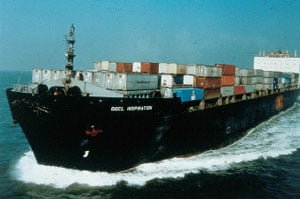
This case study shows how a multi-national corporation, Cargill, enables people throughout the world to enjoy a variety of food products and other commodities, which have often passed along distribution channels covering thousands of miles. The study also focuses on the way in which Cargill has encouraged emerging markets in Africa to develop since 1981. The growth of such markets has supported the development of sustainable self-help in a number of African countries and has enabled a number of Cargill’s businesses to expand. Cargill believes in establishing new businesses and then progressively supporting these activities by nurturing them over a long period of time. Longer term progress is more important than short term gain, although all businesses are expected to be profitable.
Cargill is the largest private company in the United States, with assets more than three times the size of the next largest. It was founded by William Wallace Cargill, the second-oldest son of an immigrant Scottish sea captain and is today owned by his descendants – the Cargills and MacMillans. The history of the company helps us to understand the way it operates today. Unlike large public companies which must maximise short term gains for shareholders, a private company like Cargill is able to take a longer term view. After more than 130 years Cargill is still a low profile and often unknown company to most consumers – largely due to the fact that there are no Cargill-labelled products on retail store shelves and no branded consumer advertising. Like many other privately held companies, Cargill releases only limited financial information. However, the company is well-known
to the agricultural, food and financial markets in which it operates. Cargill has been active in the UK since 1955 and currently employs more than 5,000 people in 22 plants and offices nationwide. Principal locations include headquarters at Cobham (Surrey) and operations at Hereford, Hull, Liverpool, Swinderby (Lincolnshire), Tilbury (Essex) and Wolverhampton. African activities are also directed from the company’s UK headquarters.
The world’s economy
Large multinationals, such as Cargill, play a valuable role in the international world economy. Cargill, for example, provides a broad range of food products and commodities. If your answer is ‘yes’ to any of the above questions, then you are likely to have consumed something from Cargill today. Answer ‘yes’ to a number of these questions and you will start to realise the role international marketers and processors of commodities play in the world’s food supplies and economy.
Much of Cargill’s revenue comes from trading. It is a leading importer and exporter of grain world-wide and it buys, stores, ships and sells most other crops. It is an international marketer and processor of agricultural, financial and industrial commodities and employs more than 76,000 people in nearly 1,000 locations in 66 countries. Company businesses are classified into three segments: Commodity Trading and Processing, Industrial and Financial. Principally, Cargill operates in four geographic regions: Asia/Pacific, Europe/Africa, Latin America and North America. The company has approximately 40 per cent of its assets invested in businesses outside North America.
Commodity Trading and Processing
Trading
- Coffee
- Cotton
- Fats and Oils
- Freight Operations/Vessel Charter
- Grain
- Petroleum
- Rubber
- Sugar
Processing
- Cattle Feedlots
- Cocoa
- Contract Pig Production
- Feed
- Fertiliser Production and
Distribution
- Flour and Rice Milling
- Fruit Juices and Concentrates
- Malt
- Meat (Beef, Pork, Poultry and
- Eggs)
- Oilseed Processing
- Salt
- Seed
Industrial
- Ferrous Metals Trading
- Steel and Wire Service Centres
- Steel Manufacturing
- Steel Recycling
Financial
- Brokerage
- Commodity and Financial Futures
- Financial Instrument Trading
- Leasing
- Structured Finance
Increasingly global markets

Today, lifestyles are increasingly global. If you visit an English supermarket in early summer, you will be able to buy fresh coffee beans from Zimbabwe. If you want to send fresh cut flowers in the middle of winter then they are likely to have been grown in Kenya. As never before, we live in an international economy based on the transfer of information, resources and goods around the globe. In this expanding international marketplace, we communicate instantly and see the rapid spread of technologies to new developing markets.
The international economy exists because of the benefits trade brings. People in one country can benefit from exchanging their produce for goods and services produced elsewhere. For example, the quality of whisky produced in Scotland is very high, due to the climate, the water, and the crops. Whisky is therefore one of the UK’s largest exports by value. At the same time, we are able to purchase a range of products which can more favourably be produced by other countries because of their climate, soils and geological structures. Every year, more goods are traded on a global scale. Many of these are highly sophisticated end products such as automobiles, compact disc players, or computers. However, many highly sophisticated products, on which we base our daily lifestyles, are produced using commodity raw materials from the beginning of the value chain.
This case study focuses on how Cargill creates the production and distribution chain for essential products at the base of the economy: corn syrup and vegetable oil, feed supplements, flour, orange juice, rock salt and many more. Cargill is one of many multinational companies that form the core of the world’s trading system.
Vision and mission
Cargill has grown to its present scale as a result of long-term planning. Bringing together producer and consumer by:
- finding new and innovative ways to process and transport basic goods and services efficiently and economically
- drawing upon years of knowledge and experience to meet the needs of today and prepare for the challenges of tomorrow.
These are the traditions and commitments of Cargill. Cargill’s vision is to raise living standards around the world by delivering increased value to producers and consumers.
Mission
‘We will accomplish this vision by being the best at merchandising, processing and distributing agricultural and other commodities. We will reinvest a substantial amount of our cash flow to provide needed products and services for our customers, rewarding career opportunities for our employees and attractive long-term value for our shareholders. We will be a valued customer of our suppliers and responsible neighbours in our communities.’
Cargill’s basic beliefs are founded upon:
- Integrity – Our word is our bond.
- Excellence – Making Cargill the best at whatever it does.
- Growth – Creating opportunities for individuals and our businesses.
- Teamwork – Pooling individual knowledge and skills through effective communication to build shared success.
- Long-term view – Having the patience and foresight to build sustainable businesses for the long haul.
- Desire to compete – Seeking to win on an open, level playing field.
Cargill provides an object lesson in running an effective business in a
number of respects:
- In particular, it has stuck to what it does best and in areas where it has built up a wealth of experience over a long period of time, namely processing and transporting goods and services. It has stuck to its core competencies as a middleman, skilled at removing inefficiencies in the chain of supply from the producer of raw material to the retailer. It has rarely become directly involved in farming, or in selling branded products to customers.
- It has benefited from concentrating on economies of scale in businesses where size brings considerable benefits. Cargill started in grain and has since moved on to a range of other commodities. This range lessens the impact on its earnings of price swings in a particular commodity and makes maximum use of shared distribution channels (ships, freight trains, etc.) and storage facilities.
- Cargill follows a conservative, long-term approach to investing. The company is involved in fulfilling basic human needs, primarily for food and food-related products. Cargill seeks to extend the basic skills it has developed in these businesses to areas in which they are both needed and wanted. Unlike some other multinational concerns, Cargill is in the business of serving market demand – not creating it.
Ethical behaviour
Ethics are the moral principles or guidelines which underpin what an organisation believes to be right or wrong. Many decisions made by Cargill have an ethical component, often involving relationships between producers and intermediaries. It is for this reason that strong, clear ethical values are built into the organisation’s culture, enabling Cargill’s decision makers to take long term views on issues as they arise.
Emerging markets
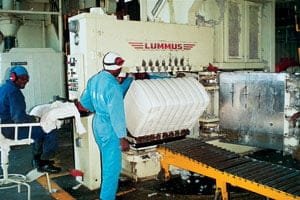
Cargill has been active in agricultural merchanting and consulting, commodity trading and food ingredient processing in Africa since 1981. Business activities include commodity trading – from cocoa and coffee beans to petroleum; breeding, production and sales of high-yielding, early-producing, disease-resistant maize and sunflower seed; processing food and agricultural products – cotton, rice and vegetable oil for cooking; warehousing and distributing food and agricultural products.
Cargill’s African investments span ten countries across the continent. Twenty offices and facilities in Egypt, Ethiopia, Kenya, Malawi, Nigeria, South Africa, Tanzania, Uganda, Zambia and Zimbabwe today employ some 2,500 people, including more than 1,500 seasonal employees. Cargill’s approach in Africa has been to start on a small scale. The business may be seed research and production, basic processing or trading. The company uses this initial investment to learn about the market as well as the social, political and economic environments. The strategy is to reinvest the profits from the businesses so they can grow over a time scale suitable to Cargill as well as the needs of customers in the host country.
Cargill is committed to developing and providing the necessary skills for basic human needs and contributing to national economic growth. It seeks to invest within countries in which these skills are allowed to operate productively. Increasingly, markets have been developing in Africa based on principles of free enterprise, rather than government managed prices and production. In recent years, the International Monetary Fund and the World Bank have only been prepared to provide finance to governments which are prepared to allow free markets to develop. As a result, Cargill has looked at opportunities for development in Africa in a far more positive light. It has sought to set up new businesses in areas where healthy new market conditions are taking hold.
Helping to generate sustainable development

Cargill believes that sustainable economic development can be achieved in Africa, if governments, international agencies, aid organisations and private sector companies work together and appreciate each others’ contributions. The role of companies like Cargill and others in the private sector is to serve as agents of economic development. Companies perform best when they have economic incentives to inspire innovation or to lower costs, both of which lead to the generation of wealth. Wealth, in this context, means having the ability to send one’s children to school, rather than having to make them work or to become a contributing member of the economy rather than being a subsistence farmer. The process also generates wealth that can be taxed to pay for public investments in education, roads and bridges or basic sanitation. By helping to create wealth and build stronger economies, Cargill promotes sustainable self-help and the means necessary to address many of the social, political and environmental problems facing Africa.
Investments
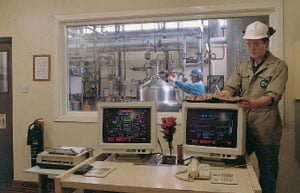
In 1996, Cargill acquired two cotton ginning operations from the government-owned Cotton Company of Zimbabwe. The cotton gins are located in Chegutu and Tafuna, respectively 108 miles south and 50 miles north of the capital of Harare in central Zimbabwe. The cotton gins were CargillÕs first processing plant investments in the country and in financial terms, the most significant in Africa.
The move followed the International Monetary Fund’s pressure on Zimbabwe to break away from its state monopolies and privatise industries in order to encourage the development of markets and a new spirit of enterprise. For Cargill, this presented an opportunity both to help Zimbabwe develop new effective markets and also to ensure a high quality supply link through its own direct investment in facilities in Zimbabwe. The gins’ main suppliers are smallholder cotton farmers, the most rapidly growing sector in the national cotton business. The privatisation process enables smallholders to increase their production of this reliable cash crop. Cargill pays farmers on the spot when they deliver their crops, as it does in Malawi and Tanzania. This has marked a significant change in farmers’ incomes, from the previous situation where the government marketing boards often took as much as eight weeks to process payment. The two gins employ a combined workforce of about 40 permanent and 130 casual and seasonal staff. With the funds gained through selling two of its gins to Cargill, the government’s Cotton Board is building another gin, further expanding the industry. A look into the future, then, suggests farmers will grow even more cotton to supply the competing gins, increasing both their own income and the income the country will earn from exports – income which can be used to further its overall growth and development.
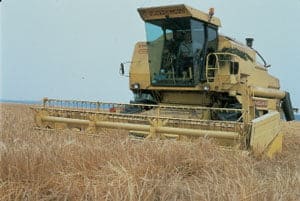
On the global market, Zimbabwe is a sought-after producer of premium (high quality), consistent quality cotton, averaging 250,000 tons per year. The privatisation of the Zimbabwean cotton industry is a welcome one for cotton consumers worldwide. The Cargill gins are located in two of the country’s main cotton growing areas and together process approximately 75,000 tons of cotton lint annually. This is some 30% of the total Zimbabwean output. The gins play a significant role in the national supply chain. They also play a valuable role in the national economy. In the first year of the gins’ operation, Cargill paid farmers approximately $40 million. Much of this was then injected into the economy by being spent locally on food, clothing, education, home and business improvements, etc.
Conclusion
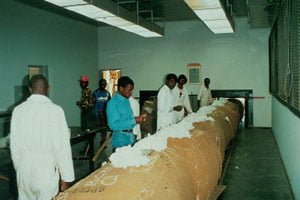
The Cargill case study provides a fascinating insight into the way in which large intelligent enterprises lie at the heart of the international trading system. By growing in a careful and balanced way, they enable basic products to be introduced and developed in world trading markets in an effective way, thus helping to ensure higher living standards for more and more people.
